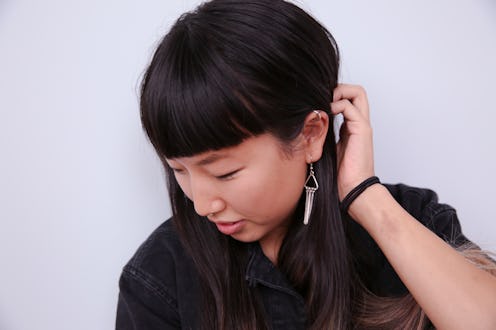
As someone who's experienced having a dry scalp, I can tell you that it's anything but fun. If you've also had, or have the same problem, you understand what it's like to feel highly irritated and sometimes even embarrassed by this annoying hair issue. If you're wondering how to treat a dry scalp, worry not — I'm here to tell you how I overcame this common problem.
At its most basic level, dry scalp is mainly a result of "loss of moisture in the skin," according to Dr. David Bank, Director at The Center for Dermatology, Cosmetic & Laser Surgery. Everyday Health says that dry scalp, and consequently, dandruff, can occur due to several causes, from heredity and stress to eating spicy foods and weather changes. You'll know it's happening to you when your scalp starts to itch and you see those dreaded flakes falling from your head. I know those symptoms all too well.
Throughout college, I had to deal with having a dry scalp during the colder seasons. I found it rather odd actually, since my hair had always been really oily and I never really had a problem with dryness or irritation. However, due to my surroundings (read: stress and a colder climate), my scalp became extremely dry and was a nuisance to deal with.
After doing some research, I discovered specific remedies that could help clear up my dry scalp. If you're currently dealing with itchiness, dandruff, and dry skin on your head, here are a few ways to treat it this winter.
Use Apple Cider Vinegar
(Bragg Apple Cider Vinegar, Vitaminshoppe.com, $3.99)
Dr. Bank explained that one of the best ways to avoid a dry scalp is "through natural remedies such as apple cider vinegar to help restore the pH on your scalp and remove any build up." This was actually the remedy I used to get rid of my dry scalp and it worked like a charm. I just applied the vinegar throughout my scalp and massaged it thoroughly. Sometimes I mixed it with water to dilute the solution.
Massage Your Scalp With Natural Oils
Hair Buddha recommends scalp massages using natural and essential oils to hydrate your skin. You can use anything from lavender to rosemary. Don't forget our beloved coconut oil!
Use A Natural Hair Mask
Amika Nourishing Mask, Sephora.com, $28
This seems obvious, but it needs to be stated: Hair masks are a great way not only to repair dry and damaged hair, but restore moisture to dry and irritated scalps. There are many different options out there, so choosing one that's best for you is the most important. If you're not into making your own DIY hair mask, consider one that incorporates natural ingredients and oils.
Want more beauty tips? Check out the video below, and be sure to subscribe to Bustle’s YouTube page for more hacks and tricks!
Images: Isla Murray/Bustle; Courtesy of Brands